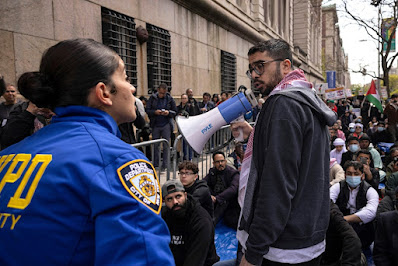Columbia University Protest Negotiations Collapse, Will Not Divest
By Al Mayadeen English
The negotiations regarding the protests at Columbia University over the ongoing Israeli genocide in Gaza collapse as students have determined that the faculty was negotiating in bad faith.
Columbia University refused to divest from the Israeli occupation as negotiators did not manage to reach an agreement, University President Minouche Shafik announced Monday morning in an email, the Columbia Spectator reported.
Shafik "urge[ed] those in the encampment to voluntarily disperse," adding that the University was "consulting with a broader group in our community to explore alternative internal options to end this crisis as soon as possible."
The President of Columbia University faced increased pressure on Friday as a campus oversight committee strongly condemned her administration's actions in suppressing a pro-Palestine demonstration in the school.
Talks between members of the administration, the University's Senate, and the protesting students have been ongoing for the past week with the goal of achieving the student's demands in exchange for getting them to stop protesting and camping on campus. However, the effort has faltered due to "bad faith" on the university's end.
The faculty had announced a midnight deadline for reaching an agreement before it began exploring "alternative options for clearing the West Lawn."
After the deadline expired, the students negotiating on behalf of the protesters left the talks and pledged to return only on the condition of "good faith bargaining and protections for nonviolent protesters against police and military violence" as they have been getting assaulted and detained by the local police department, with some even calling for the army to be mobilized against their peaceful protests.
After the negotiators left, the university backed down on its decision and decided to postpone the deadline.
Inadequate offers
The email, moreover, underlined that the university had made several other offers, including one to develop an "expedited timeline" for divestment from the Israeli occupation and another to establish a process allowing students to access a frequently updated list of the university's direct investment holdings.
"The university's goal for the talks was a collaborative resolution with the protestors that would result in the orderly removal of the encampment from the lawn," Shafik claimed. "The students also were asked to commit going forward to following the university's rules, including those on the time, place, and manner for demonstrations and events."
Columbia University Apartheid Divest (CUAD) addressed the negotiations Sunday, describing the University's offers as "unacceptable."
Some demands by the students include amnesty for disciplined students, divestment from the Israeli occupation, and financial transparency on the university's holdings.
Moreover, CUAD highlighted that "The University has openly admitted to surveilling students involved in the current encampment, and has stated that they would face a disciplinary process if they fail to identify themselves."
"The University still withholds the right to punish students who do identify themselves for any actions it deems a 'violation of policies.' Finally, the University's offer is contingent on the camp being dismantled without noise and the ejection of non-affiliates," it added, which completely goes against the negotiators' demands.
Democrats pressure campaign
The email came before it was revealed by Axios that the Columbia University board has recently come under pressure from several Democrat House Members to end the ongoing encampment and protests against the genocide in Gaza, demanding that the faculty "act decisively" in the face of the student protests.
This group of House Democrats sets a precedent, as the Republicans have been leading the campaign against the pro-Palestine students, and though the Democrat Biden administration is responsible for the police crackdown on these students, the party itself had not publicly adopted any policy on the demonstrations.
Some 21 lawmakers signed a letter to the university's board in which they voiced their "disappointment that, despite promises to Columbia University has not yet disbanded the unauthorized and impermissible encampment of anti-Israel, anti-Jewish activists on campus," Axios said, which echoes the same rhetoric of Republicans who are calling the protesters anti-Semitic for their anti-Zionist sentiment and despite there being countless Jewish students mobilizing for the cause.
Universities across the United States have witnessed in the past few weeks a historic surge in student protests in support of Palestine and Gaza, calling for ending all agreements with "Israel" and divesting from the occupation entity. Students also demanded an end to US support to "Israel" and involvement in the genocidal war.
Cross-country protests in the US continue to grow as the Israeli genocide in Gaza reaches its 206th day. The Palestinian Ministry of Health in Gaza announced on Saturday that the number of Palestinians killed in the ongoing Israeli genocide in the Strip since October 7 has now reached 34,388, with 77,437 injured.
After Columbian students established their Gaza Solidarity Encampment on April 17, University President Nemat Minouche Shafik summoned the NYPD to the campus to disperse the demonstrations, resulting in the arrest of over 100 students. But shortly after, outraged by the footage of their fellow students being arrested, a new group of students arrived on campus and set up another encampment in protest.

No comments:
Post a Comment